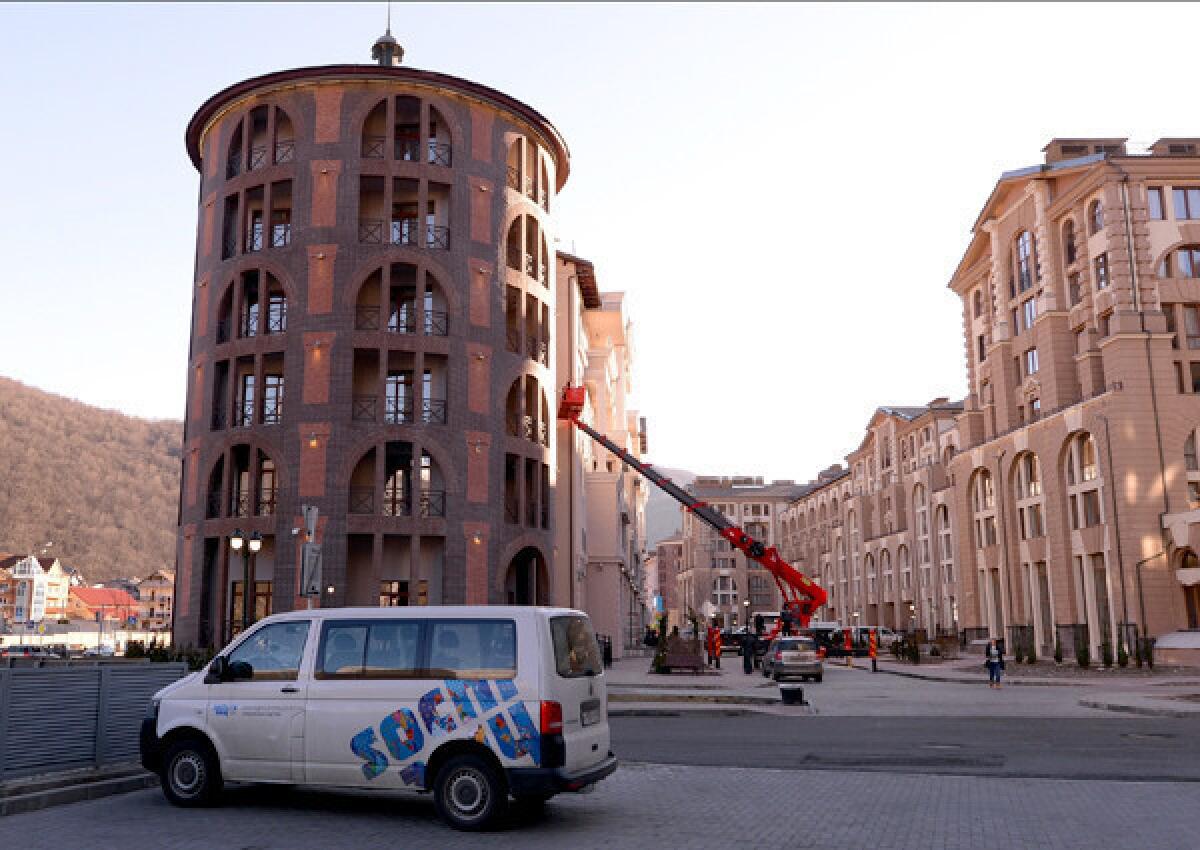Sochi Olympics: A sleepy ski village stakes its future on the Games

- Share via
KRASNAYA POLYANA, Russia — Maxim Lugovoi stands in the town square, dressed in a Lightning McQueen costume and holding a palette of colorful face paints.
At 22, his job during these Olympics is to engage spectators, paint their home country’s flag on their cheeks and make them feel welcome.
“German? Austrian? Swiss?” he asks the rare passerby in English. “Come, come, come. I help you. I make you happy for this big day.”
FRAMEWORK: View the best images from the Sochi Olympics
Lugovoi pitches his face-painting services as if his very livelihood depends upon it — and in many ways it does. He is a local, one of the 4,598 Krasnaya Polyana residents who have staked their future on an economic boost from these Games.
The Russian government poured a reported $51 billion into the Sochi Olympics, the most ever spent on any Games, in the hopes of turning this sleepy ski village into an international tourist destination. It has been an arduous, quixotic task and the results, so far, have been mixed.
“We are sad now. But it will be good soon,” Lugovoi says. “And when it is good, we will be very happy.”
Nestled against the snow-capped Caucasus Mountains, Krasnaya Polyana has experienced a major metamorphosis in recent years as roads, rail lines, shopping centers and hotels were built for these Games. The projects often suffered from weather delays, cost overruns and corruption allegations, leaving the town somewhat unprepared for the influx of visitors last week.
“This was born from nothing and it was very difficult for us,” said Alexei Polichev, 27, who works at a one of the new hotels. “It is not easy to do for a small place.”
Indeed, Krasnaya Polyana, where the skiing and sliding events are taking place, has been the epicenter of the problems that plagued the Games in the days before the opening ceremony. A third of the hotels were not finished on time, leaving hundreds scrambling to find temporary lodging. Many restaurants still aren’t open for business, and the 40-mile train ride to Sochi takes twice as long as promised.
In the Gorky Gorod area, a four-story shopping mall is only half-filled. Despite the jacket-free weather and medal events being held at nearby venues, the nearby square was practically empty Sunday.
The town, at an elevation of 1,800 feet along the Mzymta River, is extraordinarily clean, thanks to workers who sweep streets and pick up litter every day. It also feels almost entirely fabricated thanks to the faux Old World facades on most new buildings.
“I’m sure some critics will find some disadvantages, but all the venues were built from the very beginning,” Russian Deputy Prime Minister Dmitry Kozak said before the Games. “This was basically a field and we built everything new. The fact we managed to build it is a big victory for us and, as we often say in Russia, do not judge the victors.”
The locals, however, appear far more sheepish about the gaffes that made Krasnaya Polyana an international punch line last week. Hotel employees have become professional problem-solvers for visitors, and shopkeepers thank customers profusely for coming.
Without first asking if things have been bad, residents often ask if things are getting better.
“It is important you go home with a changed impression of Russia,” Mayor Svetlana Zhurova, an Olympic speedskating champion, said before Sochi’s Olympics opened. “Perhaps you will find your true love here.”
Russian officials contend the Krasnaya Polyana region already has benefited from the publicity surrounding the Games, claiming winter tourism increased by 14% last year and hotel bookings by 80%. The number of foreign visitors more than doubled last year as well, Sochi 2014 spokeswoman Aleksandra Kosterina said.
Krasnaya Polyana primarily draws tourists from Russia, Belarus and Kazakhstan, though officials say they want to transform it into a destination for Western visitors as well. In the coming months, Sochi tourism authorities will be attending trade fairs in London, Berlin and Beijing to promote the ski town’s new image.
That’s welcome news to Evgenii Filatov, a DJ who has been working for several days in a public square overlooking Gorky Gorod. As he plays thumping Russian techno pop, three hired dancers twirl and coax tourists to join them.
Few people do, so after a few hours the dancers leave and head back down the mountain. Filatov is left by himself to smoke and play booming music that people largely ignore.
He does not appear worried.
“I don’t know where are the people,” he said. “But I wait for them and I smile.”
Twitter@stacystclair
More to Read
Go beyond the scoreboard
Get the latest on L.A.'s teams in the daily Sports Report newsletter.
You may occasionally receive promotional content from the Los Angeles Times.






